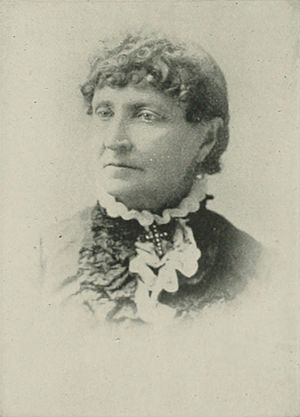Amalia Post facts for kids
Amalia Post (born January 30, 1826 – died January 28, 1897) was an important American leader who worked for women's right to vote, also known as suffrage. For 25 years, she was a key figure in the women's suffrage movement. She played a huge role in helping women get the right to vote in Wyoming Territory in 1869. This happened thanks to the very first 1st Wyoming Territorial Legislature.
Contents
Early Life and Journey West
Amalia Barney Simons was born in Johnson, Vermont, on January 30, 1826. Her family had a long history in America. One of her ancestors, Thomas Chittenden, was the first Governor of Vermont. Several family members also served as officers in the American Revolutionary War and the War of 1812. Her parents were William Simons and Amalia Barney.
In 1855, she married Walker T. Nichols in Lexington, Michigan. This marriage later ended. In 1864, in Chicago, she married Morton Everel Post. Two years later, in 1866, she and her husband traveled across the Great Plains. They first settled in Denver, Colorado, before moving to Cheyenne, Wyoming, in 1867. Wyoming became their permanent home.
Fighting for Women's Vote
Amalia Post's life in Wyoming was closely connected to the story of women gaining equal political rights. Many believe that she, more than anyone else, was responsible for women in Wyoming getting the right to vote.
Making History in Wyoming
In 1869, the first legislature of Wyoming Territory gave women the right to vote. This was a new idea, and many people didn't expect women to actually use these new rights. However, the movement succeeded and became a lasting part of Wyoming's history. This was because educated and cultured women like Amalia Post used their new privileges wisely. They took on their political duties without losing the respect of others.
Amalia Post was a member of the Republican party's Territorial Central Committee for four years. She also served on juries several times. She was even the leader of a jury that handled an important legal case, which was a big step for women in the legal system. In 1871, she was a delegate to the Woman's National Convention in Washington, D.C.. There, she spoke to a large crowd about how women in Wyoming had gained their freedom to vote.
Protecting the Right to Vote
In the fall of 1871, the Wyoming Legislature tried to take away women's voting rights. Amalia Post personally asked Governor John Allen Campbell to stop the bill. The Governor told her, "I came here against woman suffrage. But the hard work and loyalty you and your friends have shown in political duties have convinced me that you deserve these rights." He then vetoed the bill, meaning he rejected it.
However, a strong effort was made to pass the bill anyway, even over the governor's veto. It looked like they might get enough votes to do it. Amalia Post, with her smart political thinking, decided to find the one vote they needed to stop it. She made a strong appeal to one of the most educated members of the legislature, Senator Foster. She convinced him to support women's suffrage. When the final vote was taken to override the governor's veto, Senator Foster voted "No." Because of this, women's suffrage became a permanent right in Wyoming.
A National Voice
From 1880 to 1884, Amalia Post lived in Washington, D.C. Her husband was a delegate to Congress from Wyoming during this time. With her social skills and strong character, she gained many friends for the cause of women's suffrage. She helped change the minds of people who thought that only "forward" or "immodest" women wanted to vote. Starting in 1873, she served as the vice-president of the National Woman Suffrage Association.
Legacy
In 1890, women's equal rights in Wyoming were made permanent by the state's new constitution. Amalia Post was chosen to be the president of the committees for the statehood celebration. During this event, a copy of the State constitution was given to the women of the State by Judge Melville C. Brown. He had been the president of the convention that created the constitution. Amalia Post accepted the book on behalf of all the women in Wyoming.
She passed away in Cheyenne on January 28, 1897.
 | Mary Eliza Mahoney |
 | Susie King Taylor |
 | Ida Gray |
 | Eliza Ann Grier |


